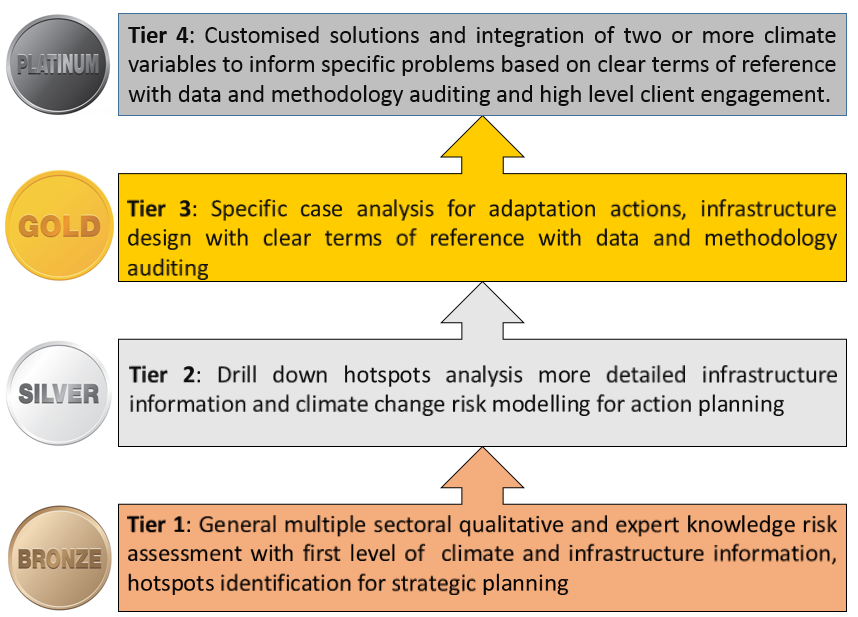Limitations, Uncertainty and Data
The methods employed in developing SimClim involve the following limitations and uncertainties:
- ClimSystems ascribes to the ethical principles in the use of climate data as explained in: Toward an Ethical Framework for Climate Services - A White Paper of the Climate Services Partnership Working Group on Climate Services Ethics
- Historical observation data limitations: Values presented in SimClim must be viewed as best estimates. The most important limitation in relation to historical meteorological observation data are not compiled appropriately for use in climate modelling.
- Uncertainty in projections: The scenarios (RCPs or SSPs) one selects in using SimClim represent a range of projections for future global change. However, the uncertainty range presented cannot cover the full range of uncertainties of future climate change.
- Uncertainty in translating GCM global scale results to the local scale: The future projections of precipitation were generated from AR5 and AR6 GCMs using pattern scaling and/or spatial interpolation methods. There are a range of downscaling approaches applied depending on the area of study. In all cases the approach is based on the best available knowledge for this location and readily available data.
Other Climate Data Sources
There are numerous data and information providers around world, such as WorldCLIM and World Bank portal, which only provide limited variables. However we cannot find comparable publicly available data sources in relation to the following important features of CLIMsystems datasets:
(1) Legitimate: We follow the conventions, guidance and standards of IPCC and country specific, scientific and engineering communities and articulate these transparently in documentation.
The CLIMsystems devised SimClim sea level rise methodology and dataset was applied in IPCC sea level rise guidance documentation.
(see Nicholls, R. J., et al. (2011). Constructing sea-level scenarios for impact and adaptation assessment of coastal areas: A guidance document. Supporting material, Intergovernmental Panel on Climate Change task group on data and scenario support for impact and climate analysis (TGICA)(47).
The CLIMsystems devised and SimClim deployed extreme precipitation dataset was applied by a client in generating the EPA CREAT tool. (See https://www.epa.gov/sites/production/files/2016-05/documents/creat_3_0_methodology_ guide_ may_2016.pdf) and is being updated with CMIP6 data and SimClim in 2023.
(2) Wide ranging: We can provide high resolution and a wide range of climate-related data obtained through partners and provision of secondary data from respected and fully documented sources, including a wide range of climate change-related parameters or variables within the realms of land, ocean, coast and extremes and means for derived variables and parameters for impact models.
(3) Defensible: Is scientifically robust and is assured through scientific review and advisory groups internally and externally. We have a dedicated team of climate data scientists to explore, manage and update proprietary database, and cross validate data using multiple sources as required. All the datasets provided to clients are clearly referenced and documented.
(4) Actionable: We deliver climate and derived analysis results fit for purpose for adaptation planning and engineering projects, through a tiered approach for different applications.

Climate change impact/risk assessment needs highly specialised experience and knowledge of climate change science, and a thorough understanding of climate change data and its limitations and applicability to specific climate-related problems.
The development of our in-house city and asset risk tool and datasets is a result of twenty years of dedicated practice in different sectors.
Close and seamless cooperation of a team with experts and specialists in climate data and with sectoral experience can offer a range of integrated and useful information for different sectors. Common understanding of data applications, limitations and caveats, and transparent communication and interpretation of the data is very important in achieving credible outputs.
All the data created by CLIMsystems could be replicated by other teams if they have enough expertise as all the methodologies used in generating the datasets are well documented and the raw data used is publicly available. That said a cold start for replication would require considerable time (years) and resources as terabytes of raw GCM data and processed RCM data from CORDEX and other very extensive and large datasets would need to be acquired, critically assessed and processed.